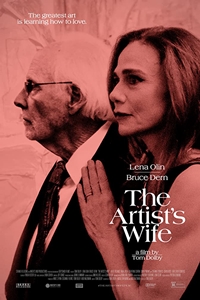Canada: Friday, September 25, 2020
Calgary: Friday, October 02, 2020
Strand Releasing
for language, some graphicnudity and brief sexuality
Claire (Lena Olin) lives a domestic life in the Hamptons as the wife of celebrated artist Richard Smythson (Bruce Dern). Once a promising painter herself, Claire now lives in the shadow of her husband's illustrious career. While preparing work for his final show, Richard's moods become increasingly erratic, and he is diagnosed with dementia. As his memory and behavior deteriorate, she shields his condition from the art community while trying to reconnect him with his estranged daughter and grandson from a previous marriage. Challenged by the loss of her world as she knew it, Claire must now decide whether to stand with Richard on the sidelines or step into the spotlight herself.

Cast & Crew
Movie Cast
Movie Crew
User Reviews
Public Reviews - 1 Reviews
-
Gregory M. - Rated it 3 out of 5
"The Artist's Wife" Once a promising painter herself, Claire Smythson (Lena Olin) gave up on her own career to stand by the side of her famed abstract artist husband Richard (Bruce Dern) for over 20 years. She lives a domestic life in the shadow of her husband’s illustrious career. When Richard is unexpectedly diagnosed with dementia during preparations for his latest exhibition, Claire is thrown into a crisis; suddenly torn between her husband’s erratic mood swings and the need to shield his illness from both the art community and their family. As his memory and behavior deteriorate, she shields his condition from the art community while trying to reconnect him with his estranged daughter Angela (Juliet Rylance) and grandson Gogo (Ravi Cabot-Conyers) from a previous marriage. Struggling to regain control of her life, Claire takes up painting once again. Challenged by the loss of her world as she knew it, Claire must now decide whether to stand with Ric**** ** the sidelines or step into the spotlight herself. Can she finds her power as she deals with the disintegration of the man she loved? Lee Krasner. Elaine De Kooning. Camille Claudel. Dora Maar. History is filled with female artists who've supported their more famous husbands or partners. "The Artist’s Wife" is a tribute to these women, a contemporary imagining of the journey of the stronger woman behind the man, and what happens when the relationship begins to crumble due to circumstances beyond either person’s control. In our cinematic landscape today, the experience of the middle-aged woman as she enters the third act of life is often ignored. In "The Artist’s Wife", Claire’s passage is about new beginnings, about rediscovering the parts of herself that she left behind during the early years of her marriage, as well as recognizing qualities she never knew she had. Stories about women spending their lives supporting their husbands are not, rightly so, where our culture is oriented today. They may strike us as retrograde or well-trodden ground, not worthy of exploration. "The Artist’s Wife" reclaims this narrative, showing the tail end of this journey of living in, and coming out of, the shadows. Though we see Claire making great sacrifices, with dignity, to the film’s conclusion, we know she has a future beyond that with her husband. Claire’s story, the part we see, is one of commitment, of sticking with the life she has chosen, at least until circumstances change. "The Artist’s Wife" honors the many women and men who've stuck by their partners, artists or otherwise, through challenging circumstances. Though the film’s story begins with Richard’s disease causing the inciting series of incidents, "The Artist’s Wife" is not an 'Alzheimer’s' movie in the traditional sense. Though there are many fine films in this subgenre, the story is instead about the caregiver, about Claire’s experience with the disease. As the years went by,we notice that in the film, the perspective of the caretaker is largely ignored. Whether one views the story as an 'Alzheimer’s' movie or not, Richard’s dementia represents to Claire a call to reclaim her own past when it's, like his memories, in danger of slipping away. His illness prompts her passage into her creative soul, not initially to protect his dignity, but to save her own. These two goals collide at the end of the film, and she must make the decision that's right for her. Society and popular culture have told us that the years around sixty are about slowing down, about retiring, a word that's originated as meaning to withdraw to a place of safety or seclusion. But why should the third act of life be one of retreating, repressing, hiding? The hope for Claire at the end of the film is that she's ready for a new chapter, one in which she will shine as brightly as her husband once did. 'The problem with being constantly surrounded by bright lights',,she says, is that they make you feel there’s already enough light in the world. May the film’s narrative allow Claire to release this belief and let her talent run free, it's brilliant beams lighting up the sky. written by Gregory Mann